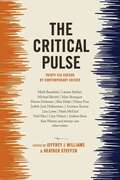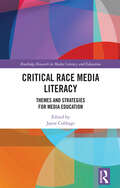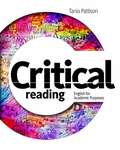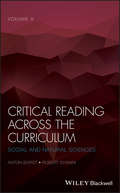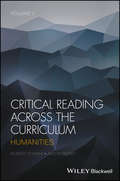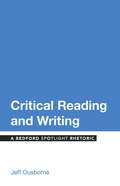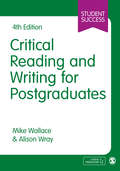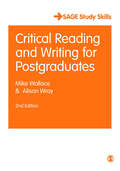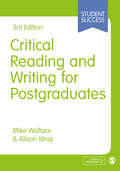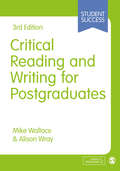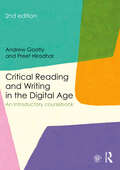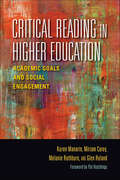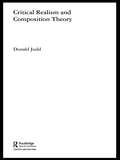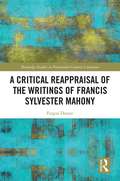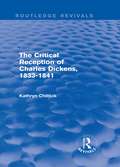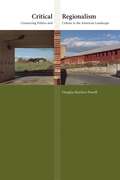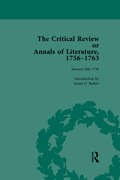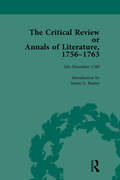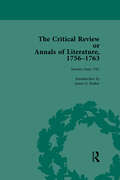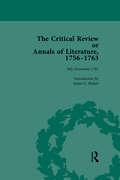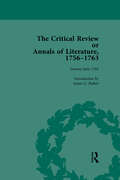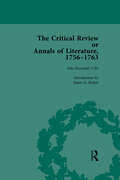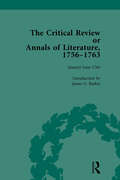- Table View
- List View
The Critical Pulse: Thirty-Six Credos by Contemporary Critics
by Jeffrey J. Williams Heather SteffenThis unprecedented anthology asks thirty-six leading literary and cultural critics to elaborate on the nature of their profession. With the humanities feeling the pinch of financial and political pressures, and its disciplines resting on increasingly uncertain conceptual ground, there couldn't be a better time for critics to reassert their widespread relevance and purpose. These credos boldly defend the function of criticism in contemporary society and showcase its vitality in the era after theory. Essays address literature and politics, with some focusing on the sorry state of higher education and others concentrating on teaching and the fate of the humanities. All reflect the critics' personal, particular experiences. Deeply personal and engaging, these stories move, amuse, and inspire, ultimately encouraging the reader to develop his or her own critical credo with which to approach the world. Reflecting on the past, looking forward to the future, and committed to the power of productive critical thought, this volume proves the value of criticism for today's skeptical audiences.
Critical Questions: Invention, Creativity, and the Criticism of Discourse and Media
by Carole Blair Gary A. Copeland William L. Nothstinestudy of critical invention-how critics select the questions they want to ask of a text as critics
Critical Race Media Literacy: Themes and Strategies for Media Education (Routledge Research in Media Literacy and Education)
by Jayne CubbageThis volume offers deeper exploration and advancement of critical race media literacy, a concept which fuses the genres of media literacy and critical media literacy with critical race theory to bring a new and salient frame to the discussion of media literacy across all levels of education in today’s globalized, race-based, and media-saturated climate. Bridging the gap in research that has not addressed the ways in which media is a conduit of racial dialogue and ideology, the book brings together a diverse group of scholars that explore their perspectives on critical race media literacy as it is experienced from the interface and consumption of a variety of media texts and social phenomena. Topics addressed include news literacy, children’s literature, Black political movements, media protests, and ethnic rock—Critical Race Media Literacy addresses these topics within existing media literacy contexts to enhance media literacy scholarship and educational pedagogy. This book will provide a timely and important resource not only for scholars and students of media literacy and media education but also for educators working in diverse learning settings.
Critical Reading: English for Academic Purposes
by Tania PattisonCritical Reading provides a systematic introduction to the process of analyzing and evaluating a written text. Students develop critical reading skills through analysis of texts from authentic sources (journals, newspapers, magazines, and websites) and a variety of academic dsiciplines. They are encouraged to develop their comprehension and vocabulary skills, while forming a reasoned assessment of the effectiveness and validity of a text.
Critical Reading Across the Curriculum: Social and Natural Sciences
by Anton Borst Robert DiYanniProvides educators with practical strategies, tools, and techniques for teaching critical reading skills to students in the social and natural sciences. Strong critical reading skills are an essential part of any student’s academic success. Teaching these vital skills requires educators to develop and implement effective teaching strategies, often based on their own critical reading practices. Critical Reading Across the Curriculum, Volume 2: Social and Natural Sciences provides educators with expert insights, real-world methods, and proven strategies to build critical reading skills in students across disciplines. Drawing from the experience of seasoned classroom practitioners, this book presents a dozen essays that offer various applications of critical reading best practices in fields such as anthropology, biology, economics, engineering, political science, and sociology. Clear, jargon-free chapters identify, explain, and illustrate best teaching practices for critical reading. Containing numerous practical examples and demonstrations, essays written by experts in their respective fields explain what critical reading requires for their discipline, as well as how to teach those skills in the classroom. Every essay includes a host of pedagogical activities, assignments, and projects that can be used directly or adapted for diverse teaching applications. This valuable book helps educators: Develop the skills students need to ask the right questions, consider sources, assess evidence, evaluate arguments, and reason critically Encourage students to practice critical reading skills with engaging exercises and activities Teach students to establish context and identify contextual connections Explain how to read for arguments, including content-based and conceptual arguments Adapt and apply teaching strategies to various curricula and disciplines Critical Reading Across the Curriculum, Volume 2: Social and Natural Sciences is an ideal resource for educators in a wide range of areas, such as college and high school instructors in science and social science disciplines and instructors of graduate education courses.
Critical Reading Across the Curriculum: Humanities
by Robert DiYanni Anton BorstPowerful strategies, tools, and techniques for educators teaching students critical reading skills in the humanities. Every educator understands the importance of teaching students how to read critically. Even the best teachers, however, find it challenging to translate their own learned critical reading practices into explicit strategies for their students. Critical Reading Across the Curriculum: Humanities, Volume 1 presents exceptional insight into what educators require to facilitate critical and creative thinking skills. Written by scholar-educators from across the humanities, each of the thirteen essays in this volume describes strategies educators have successfully executed to develop critical reading skills in students studying the humanities. These include ways to help students: focus actively re-read and reflect, to re-think, and re-consider understand the close relationship between reading and writing become cognizant of the critical importance of context in critical reading and of making contextual connections learn to ask the right questions in critical reading and reasoning appreciate reading as dialogue, debate, and engaged conversation In addition, teachers will find an abundance of innovative exercises and activities encouraging students to practice their critical reading skills. These can easily be adapted for and applied across many disciplines and course curricula in the humanities. The lifelong benefits of strong critical reading skills are undeniable. Students with properly developed critical reading skills are confident learners with an enriched understanding of the world around them. They advance academically and are prepared for college success. This book arms educators (librarians, high school teachers, university lecturers, and beyond) with the tools to teach a most paramount lesson.
Critical Reading and Writing: A Bedford Spotlight Rhetoric
by Jeff OusborneCritical Reading and Writing: A Bedford Spotlight Rhetoric helps students with key writing skills. It provides advice on how to read thoughtfully and analytically, with instruction on active reading and note-taking, plus help with analyzing visual and multimodal texts. It also takes students through the writing process, explaining important concepts such as purpose, invention, rhetorical thinking, prewriting, thesis development, and organization, providing support when they need it most. Advice on using sources, revising, and editing will help them enrich, re-see, edit, and format their papers.
Critical Reading and Writing for Postgraduates (Student Success)
by Mike Wallace Alison WrayReading critically, and writing using critical techniques, are crucial skills you need to apply to your academic work. If you need to engage with published (or unpublished) literature such as essays, dissertations or theses, research papers or oral presentations, this proven guide helps you develop a reflective and advanced critical approach to your research and writing. New to this edition: Two new chapters on basic and advanced writing skills More advice on self-bias and perception Updates and additional examples throughout Updated online resources providing additional support. A Companion Website provides additional resources to help you apply the critical techniques you learn. From templates and checklists, access to SAGE journal articles and additional case studies, these free resources will make sure you successfully master advanced critical skills.
Critical Reading and Writing for Postgraduates (Student Success)
by Mike Wallace Alison WrayReading critically, and writing using critical techniques, are crucial skills you need to apply to your academic work. If you need to engage with published (or unpublished) literature such as essays, dissertations or theses, research papers or oral presentations, this proven guide helps you develop a reflective and advanced critical approach to your research and writing. New to this edition: Two new chapters on basic and advanced writing skills More advice on self-bias and perception Updates and additional examples throughout Updated online resources providing additional support. A Companion Website provides additional resources to help you apply the critical techniques you learn. From templates and checklists, access to SAGE journal articles and additional case studies, these free resources will make sure you successfully master advanced critical skills.
Critical Reading and Writing for Postgraduates
by Mike Wallace Alison Wray'A systematic, coherent approach to developing critical reading and writing skills that are applicable to a range of different levels of analysis and types of reading and writing tasks. The authors are to be commended for the clarity of their writing and the way scaffolded advice and tasks are integrated into the text. The book could form the core text for a course on critical reading and writing and a useful reference tool for the academic recently entered upon writing for publication. ' - Educate Journal 'A very clear, accessible introduction that will be invaluable to postgraduate students trying to engage with reading and writing in a critical way' - R. M. Lee, Professor of Social Research Methods, Royal Holloway University of London This guide to critical reading and self-critical writing is a 'must-have' resource for postgraduate students and early-career academics. Packed with tools for analysing texts and structuring critical reviews, and incorporating exercises and worked examples drawn from the social sciences, the book offers step-by-step advice on how to: " read any text critically and analyse it in the depth appropriate to one's project " develop a self-critical approach to one's own academic writing " ask questions in order to evaluate authors' arguments " keep a review manageable by using focused review questions " structure a comparative review of multiple texts " build up a convincing argument " integrate critical literature reviews into a dissertation or thesis " make the transition from postgraduate to professional academic writer Essential reading for novice researchers, the book will also be invaluable for supervisors, methods course tutors, and academic mentors who teach and support the development of critical reading and self-critical writing skills.
Critical Reading and Writing for Postgraduates (SAGE Study Skills Series)
by Professor Mike Wallace Professor Alison WrayLecturers, request your electronic inspection copy here Reading critically, and writing using critical techniques, are crucial skills you need to apply to your academic work. Practical and engaging, Critical Reading and Writing for Postgraduates is bursting with tools for analysing texts and structuring critical reviews, helping you to gradually build your skills beyond undergraduate level and gain confidence in your ability to critically read and write. New to this 3rd edition: Introduces a technique for developing critical thinking skills by interrogating paper abstracts Additional diagrams, exercises and concept explanations, enabling you to more easily understand and apply the various approaches A glossary, to help with understanding of key terms. Also new for this edition, a Companion Website provides additional resources to help you apply the critical techniques you learn. From templates and checklists, access to SAGE journal articles and additional case studies, these free resources will make sure you successfully master advanced critical skills. If you need to engage with published (or unpublished) literature such as essays, dissertations or theses, research papers or oral presentations, this proven guide helps you develop a reflective and advanced critical approach to your research and writing. SAGE Study Skills are essential study guides for students of all levels. From how to write great essays and succeeding at university, to writing your undergraduate dissertation and doing postgraduate research, SAGE Study Skills help you get the best from your time at university. Visit the SAGE Study Skills website for tips, resources and videos on study success!
Critical Reading and Writing for Postgraduates (SAGE Study Skills Series)
by Professor Mike Wallace Professor Alison WrayLecturers, request your electronic inspection copy here Reading critically, and writing using critical techniques, are crucial skills you need to apply to your academic work. Practical and engaging, Critical Reading and Writing for Postgraduates is bursting with tools for analysing texts and structuring critical reviews, helping you to gradually build your skills beyond undergraduate level and gain confidence in your ability to critically read and write. New to this 3rd edition: Introduces a technique for developing critical thinking skills by interrogating paper abstracts Additional diagrams, exercises and concept explanations, enabling you to more easily understand and apply the various approaches A glossary, to help with understanding of key terms. Also new for this edition, a Companion Website provides additional resources to help you apply the critical techniques you learn. From templates and checklists, access to SAGE journal articles and additional case studies, these free resources will make sure you successfully master advanced critical skills. If you need to engage with published (or unpublished) literature such as essays, dissertations or theses, research papers or oral presentations, this proven guide helps you develop a reflective and advanced critical approach to your research and writing. SAGE Study Skills are essential study guides for students of all levels. From how to write great essays and succeeding at university, to writing your undergraduate dissertation and doing postgraduate research, SAGE Study Skills help you get the best from your time at university. Visit the SAGE Study Skills website for tips, quizzes and videos on study success!
Critical Reading and Writing in the Digital Age: An Introductory Coursebook
by Andrew Goatly Preet HiradharCritical Reading and Writing in the Digital Age is a fully introductory, interactive textbook that explores the power relations at work in and behind the texts we encounter in our everyday lives. Using examples from numerous genres – such as fiction, poetry, advertisements and newspapers – this textbook examines the language choices a writer must make in structuring texts, representing the world and positioning the reader. Assuming no prior knowledge of linguistics, Critical Reading and Writing in the Digital Age offers guidance on how to read texts critically and how to develop effective writing skills. Extensively updated, key features of the second edition include: a radically revised and repackaged section that highlights the theme of discourses of power and authority and the new possibilities for resisting them; a revamped analysis of the art of communication which has changed due to the advent of new media including Facebook and Wikipedia; fresh examples, exercises and case studies including fan fiction, articles from the BBC, Daily Mail and South China Morning Post, and a selection of international ads for a variety of products; a brand new companion website at www.routledge.com/cw/goatly featuring projects, quizzes and activities for each chapter, a glossary and further reading. Written by two experienced teachers, Critical Reading and Writing in the Digital Age is an ideal coursebook for students of English language.
Critical Reading in Higher Education: Academic Goals and Social Engagement (Scholarship of Teaching and Learning)
by Karen Manarin Miriam Carey Melanie Rathburn Glen RylandFaculty often worry that students can't or won't read critically, a foundational skill for success in academic and professional endeavors. "Critical reading" refers both to reading for academic purposes and reading for social engagement. This volume is based on collaborative, multidisciplinary research into how students read in first-year courses in subjects ranging from scientific literacy through composition. The authors discovered the good (students can read), the bad (students are not reading for social engagement), and the ugly (class assignments may be setting students up for failure) and they offer strategies that can better engage students and provide more meaningful reading experiences.
Critical Realism and Composition Theory (Routledge Studies in Critical Realism)
by Donald JuddThe field of composition theory has emerged as part of the intellectual turmoil and set of pedagogical debates which have beset higher education for the last four decades and is now revolutionizing the theory and praxis of higher education. This volume examines three of the dominant pedagogical theories within composition theory: expressivist, cognitivist, and social-constructivist and builds its critique on the fact that much of modern composition theory has focused on epistemological concerns while neglecting the ontological foundations of that which is being discussed.Critical Realism and Composition Theory offers an alternative approach to teaching composition. This problem-oriented alternative is designed to lead students beyond the abstract, contemplative description of a problem to an expanded understanding that shows that concerns for justice cannot be addressed intellectually without at the same time confronting the practical constraints that limiting powers of social institutions play in both defining a problem and its social solution.
A Critical Reappraisal of the Writings of Francis Sylvester Mahony (Routledge Studies in Nineteenth Century Literature)
by Fergus DunneThis book resituates Francis Sylvester Mahony in an early nineteenth-century literary-historical context, counteracting the efforts of twentieth-century literary historians to obscure his contribution to the emergence of a distinctive Irish Catholic fiction in English. This volume re-explores his ambivalent role as a Catholic unionist contributor to the progressive Tory London periodical, Fraser’s Magazine, examining his use of translation to map out an alternative literary aesthetic of the peripheries. The book also traces the development of his political thinking in his Italian journalism for Charles Dickens’ Daily News, in which he responded to the events of the Famine by finding common cause with Young Ireland, and looks afresh at his final incarnation as a British Liberal commentator on Irish and European affairs for the Globe newspaper. More broadly, the book seeks to re-evaluate Mahony’s cosmopolitan writings in relation to the multifaceted, transnational perspectives on Irish, British, and European affairs presented in his essays and journalism.
The Critical Reception of Charles Dickens, 1833-1841 (Routledge Revivals)
by Kathryn ChittickThis bibliography, first published in 1989, brings together a number of reviews of the early Dickens which appeared in contemporary magazines, newspapers, and quarterlies during the eight years between 1833 and 1841. The chronological arrangement of reviews, both of Dickens and others, forms the core of this study. This book is perfect for those studying Dickens and his works in-depth.
Critical Regionalism
by Douglas Reichert PowellThe idea of "region" in America has often served to isolate places from each other, observes Douglas Reichert Powell. Whether in the nostalgic celebration of folk cultures or the urbane distaste for "hicks," certain regions of the country are identified as static, insular, and culturally disconnected from everywhere else. In Critical Regionalism, Reichert Powell explores this trend and offers alternatives to it.Reichert Powell proposes using more nuanced strategies that identify distinctive aspects of particular geographically marginal communities without turning them into peculiar "hick towns." He enacts a new methodology of critical regionalism in order to link local concerns and debates to larger patterns of history, politics, and culture. To illustrate his method, in each chapter of the book Reichert Powell juxtaposes widely known texts from American literature and film with texts from and about his own Appalachian hometown of Johnson City, Tennessee. He carries the idea further in a call for a critical regionalist pedagogy that uses the classroom as a place for academic writers to build new connections with their surroundings, and to teach others to do so as well.
The Critical Review or Annals of Literature, 1756-1763 Vol 1
by James G BaskerThe "Critical Review" reflects the political, scientific and literary debate of the times. The journal was edited for its first seven years by Tobias Smollett and reflected the slashing, combative style and intellectual range of its editor. This 16-volume set reproduces this journal.
The Critical Review or Annals of Literature, 1756-1763 Vol 10
by James G BaskerThe "Critical Review" reflects the political, scientific and literary debate of the times. The journal was edited for its first seven years by Tobias Smollett and reflected the slashing, combative style and intellectual range of its editor. This 16-volume set reproduces this journal.
The Critical Review or Annals of Literature, 1756-1763 Vol 11
by James G BaskerThe "Critical Review" reflects the political, scientific and literary debate of the times. The journal was edited for its first seven years by Tobias Smollett and reflected the slashing, combative style and intellectual range of its editor. This 16-volume set reproduces this journal.
The Critical Review or Annals of Literature, 1756-1763 Vol 12
by James G BaskerThe "Critical Review" reflects the political, scientific and literary debate of the times. The journal was edited for its first seven years by Tobias Smollett and reflected the slashing, combative style and intellectual range of its editor. This 16-volume set reproduces this journal.
The Critical Review or Annals of Literature, 1756-1763 Vol 13
by James G BaskerThe "Critical Review" reflects the political, scientific and literary debate of the times. The journal was edited for its first seven years by Tobias Smollett and reflected the slashing, combative style and intellectual range of its editor. This 16-volume set reproduces this journal.
The Critical Review or Annals of Literature, 1756-1763 Vol 14
by James G BaskerThe "Critical Review" reflects the political, scientific and literary debate of the times. The journal was edited for its first seven years by Tobias Smollett and reflected the slashing, combative style and intellectual range of its editor. This 16-volume set reproduces this journal.
The Critical Review or Annals of Literature, 1756-1763 Vol 15
by James G BaskerThe "Critical Review" reflects the political, scientific and literary debate of the times. The journal was edited for its first seven years by Tobias Smollett and reflected the slashing, combative style and intellectual range of its editor. This 16-volume set reproduces this journal.
